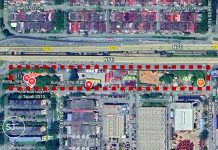By Wong Chen
Let me start by stating a fact; at RM421 billion, this is the biggest budget ever. It is still a deficit budget but with a smaller projection of 3.8% of GDP, which overall, is a responsible target. The size of this budget is understandable as the economy is projected to grow at 4.8% to 5.3% this year, with government revenue projected to increase in tandem with the GDP growth for next year too. So far, so good. The bottom line is, there are economic data and fundamentals to support such projections. Moreover, and I have yet to hear anything to the contrary from the Opposition MPs.
I will also like to take this opportunity to urge the Opposition to work harder next year, and prepare an alternative budget for 2026. It is not good Parliamentary practice for the Opposition to just debate the budget by merely criticising it without offering solutions or an alternative model. Overall, I am also disappointed by the pettiness of the debates so far from the Opposition. Many of the members are recent former ministers, and I had expected much more substance from them.
The technology sector has seen fantastic gains this year. There is an overall sense of optimism coming from the recent massive inflow of investments from foreign companies involved in data centres and high tech. I have personally visited many of these companies this year, and the strong inflow of investments have helped the Malaysian ringgit to improve and gain in value dramatically.
However, despite the tech boom, I will advise my Madani government to go to the ground and monitor closely whether this tech boom has resulted in overall economic improvements for the ordinary non-technology folks. On the ground, I have been observing increases in overall consumption at the malls of KL and Subang. Compared to Q1 and Q2 of 2024, people are eating out more, buying goods a bit more too. However, there is still a sense of persistent behavioural pessimism in the world at the moment.
For example, despite robust economic data in the US, on the eve of Trump vs Harris, most Americans actually feel poorer than before the Biden administration. As such, Harris will need all the luck this week to win.
We in Malaysia, are not immune to this overall sense of global pessimism too. Maybe this is driven by anxieties of wars across the world, from Gaza, Ukraine, Myanmar to Sudan. Maybe it is worries of climate change with even more severe weather patterns. The slowing down of global trade, as the West and China continue to clash over tariffs and currency is also a contributory factor to this pessimism.
Back home in Malaysia, I observe that many are unhappy, including myself with higher food costs at eateries and hawker centres. Last week, I find myself spending RM60 for my wife, two children and myself, for curry noodles and drinks. A year or two ago, I could feed the four of us the same meal with RM40.
In my meetings with my Subang constituents, I have assured them that with a stronger ringgit from the tech boom, food costs should drop. Malaysia imports about 60% of our food, thus a stronger ringgit should translate to cheaper prices. In theory and by using a simplistic calculation, if the ringgit is performing 10% better, then in theory we should see a 6% decrease in food prices. My best guess is that it will take about 6 months of lead time, for a drop in basic and essential food costs.
Let me return to the issue of the ringgit and in particular, the persistent issue of capital outflow. For a short period of one to two months in August and September, the sudden surge of the ringgit inspired many Malaysians to pause the continuous outflows of capital. In late September to early October, the ringgit strengthened to 4.12 to 1 USD.
Then, a strange thing happened. When out in the malls, I started noticing very, very long queues at the money changers, people selling ringgit and buying the dollar. Now, we are back to 4.3 to 4.4 to 1USD range. We had a good run for two months, then the ringgit fell again in this last 30 days. Has this to do with this Budget or just speculative Malaysians having no faith in our own economy?
Is this a case of lack of economic faith in the government? Again, I urge my government to look into this. Have Malaysians so little faith left that even as foreign investors pour in billions, we Malaysians on the other hand, take the opportunity to make some small forex gains by selling the ringgit down?
Where is the economic patriotism? However, I admit that we as politicians too are guilty for failing to instil and inspire more confidence. Perhaps the people will be more assured of better times ahead if we the MPs, can set aside our differences and work to pass some significant reforms, in particular anti-corruption and better governance reforms.
Don’t get me wrong, I applaud the government for its recent anti-corruption drive. In March this year, the government took actions on RM2 billion scandal involving smuggling and corruption in the Customs department. Last week, the MACC announced that investigations have started involving RM1.8 billion of subsidised fertilisers for rice.
Most of us in this Dewan, have known or at least heard about these corrupt practices for many, many years. Yet, nothing was done during those times. Under the Madani government, we finally have seen some enforcement actions taken. However, these are piecemeal cases. While I am happy that actions are being taken, but the reality is, the problem of corruption is systemic. And systemic problems cannot be solved by a piecemeal approach. We need a system reset on fighting corruption.
I note in particular that in March this year, my government has stated that it has finalised a new format for asset declaration which is significantly better than the system introduced in 2018. This is the systemic reform that we need and we await its implementation.
If I may add, the new better asset declaration must be made public and then audited by an independent body or by the Auditor General. In addition, the government must quickly pass laws to enable the deployment of Unexplained Wealth Order to compel MPs and senior civil servants to reveal any unexplained wealth. If we had done this decades ago, we do not need now to investigate some very old and very powerful politicians today.
Some of you may ask; what has this to do with the Budget? In May this year, the MACC announced that Malaysia has lost RM277 billion to corruption in a period of five years between 2018 to 2023. That is a staggering average loss of RM55.4 billion per year.
Let me now, put this in the context of the budget. If we could save RM55.4 billion a year from corruption, the development spending of RM86 billion for 2025, need only be funded by government bonds to a tune of just RM30.6 billion.
At RM30.6 billion, we would be projecting a mere 1.35% deficit to GDP. I can assure you, all the rating agencies of the world, including Moodys, Standard and Poor, plus all the global banks will positively promote Malaysia to the business world.
Fighting corruption in a systemic manner, will greatly boost our sovereign ratings. This will shave off at least RM5 billion to RM10 billion in interest charges alone per annum! And if we keep this up, YAB Tambun, as Finance Minister will be on track next year for Budget 2026, to repeat his glory days of 1997, when he recorded a surplus in the Malaysian budget. That to me, should be the priority of this Madani government, fighting corruption systemically. In fact, fighting corruption is more important that any subsidy rationalisation on RON 95 or the introduction of the 2% dividend tax.
Allow me to offer my quick views on these two issues that has gained much media coverage. I fully support my government’s progressive position that the rich should pay a fairer share than the poor. Every MP here in this Dewan belongs to the T15. You have the same salary as I. plus allowances minus tax and contributions, all of us here takes home around RM19,000 per month, some more, some less. I have two cars, one a small Volvo for me and one Bettle VW for my wife. We spend approximately RM500 a month of RON 95. If and when the RON 95 subsidy is lifted for the T15, my petrol cost will double to RM1,000 a month. Is the RM500 increase a month too burdensome for the T15?
Let’s consider the example of a family that has combined earnings of RM50,000 a month. A RM500 or a 1% increased burden to that family earnings, will not be very burdensome. However, for another T15 family with earnings of RM15,000 a month, a RM500 increase is a significant 3.3%. We also need to understand that the family living in KL at RM15,000 a month, is not what most will call living a luxurious T15 life. RM15,000 a month in KL is in fact very middle class; Subang middle class. Most of these middle-class families, have loans for a house and two cars. Tuition and music classes are also not cheap.
In truth, I don’t have an answer to the RON 95 T15 question, as I don’t have access to the required big data. What I am suggesting to my government is to apply real life behavioural scenarios, work with real numbers and then make a fair judgment call. Then apply these behavioural nuances to the big data that the government has. Only then, will the government be able to implement a policy that will be substantially fair. How much savings can we get from the T15 and how much is it to implement such a policy? There must also be a commitment to adjust rates after getting public feedback over a trial period.
The Madani government inherited this petrol subsidy entitlement and I applaud this brave Madani vision to be more fiscally responsible. However, please tread with caution and remember to be fair, that is all the people are asking. Getting the rich off subsidy is fair but then we need a nuance understanding of what is being rich really means. As such, please do and publish the studies. It may be that the withdrawal of RON95 subsidy applies not to the T15 but to the T10, or T8 or even the T5.
As for the 2% dividend tax, I also agree with my government that this is about the principle of progressive tax equity. The average dividend of a company is around 5% to 10%. At the 2% tax rate for dividend earnings above RM100,000, a shareholder liable to pay the dividend tax would need to own shares valued between RM1,000,000 to RM2,000,000. The person is thus not poor, and as such can be asked to pay a fairer share of tax. Both Japan and the UK has tax on dividend earnings, at much higher rates than Malaysia’s introductory 2%. Japan has a 20% rate and the UK rate averages 24%.
On the other end of the spectrum, dynamic financial centres such as Hong Kong and Singapore, do not have any tax on dividend earnings. It has been argued that the implementation of this 2% rate will drive more financial services companies away from Malaysia.
Again, I have no big data at hand. So, my parting advice to my government is to disclose to this Dewan, what are expected tax gains from this dividend tax, in other words will we be collecting RM100 million or RM10 billion in additional revenue? What is the cost to the government for collecting such a tax? What accounting collection system will be needed for its implementation? Is there a commitment to keep this 2% rate at a fixed term, say for five years? At the policy level, the government should always be alert of the financial services sector reactions to this new tax. Will more financial services companies leave Malaysia for Singapore and Hong Kong? How much do these financial services companies contribute in other taxes currently and how much will we lose, if they decide to leave our shores.
What I find a bit worrying is that this 2% dividend tax is actually neither here nor there. If you want to be serious about collecting tax and addressing inequality, then you have to do a higher tax rate than 2%. Start at 10%, that is half the Japanese rate of 20%. But if you want to keep financial services firms in KL happy, then don’t implement this tax at all. By implementing a low 2% tax, we may end up collecting nothing significant and at the same time end up chasing the financial firms away.
In conclusion, I support the broad policies of Budget 2025 but we must do so much more on fighting corruption and carrying out reforms. If we can reduce corruption to the tune of RM55.4 billion a year we can achieve a balanced budget and will soon have a surplus budget in the coming years.
As for the RON95 and 2% dividend tax, I support the noble aims of progressive and fairer taxation, but I will also need better details and clarifications from the government.













